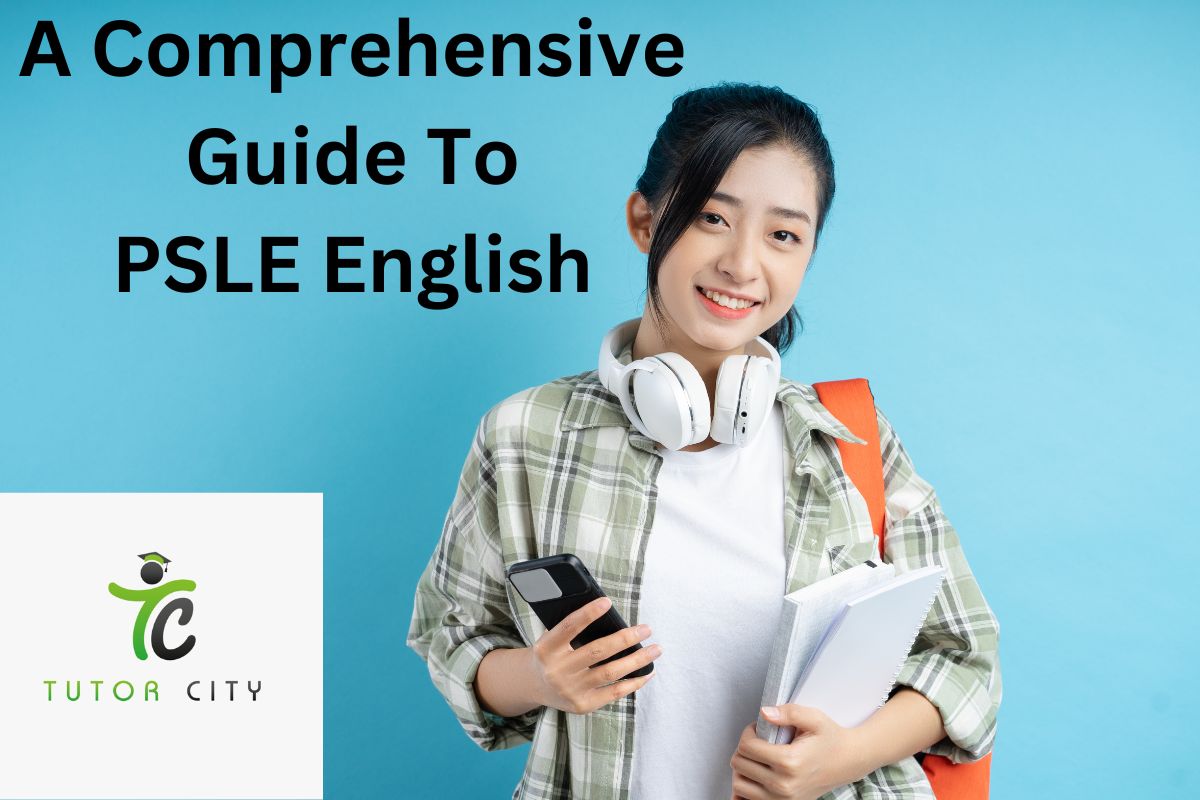
- Published by: Tutor City
- May 09, 2023
- Education
A Comprehensive Guide To PSLE English: Everything You Need To Know
A Comprehensive Guide to PSLE English: Everything You Need to Know
As the language of administration and instruction in schools, English is an important language for Singaporean students to master. Not only will students with a weak foundation in English score poorly in the subject, it can also impede their understanding of other PSLE subjects they are taking, such as Maths and Science. Besides Mother Tongue, all subjects are taught through the medium of English and as a result, the global lingua franca can be considered the first language of most Singaporeans.
Ahead of taking on PSLE in Primary 6, parents will want to ensure that their children are well-prepared to face the challenges ahead of them. This includes addressing areas and subjects of weakness early in order to build a strong foundation. As students will need to continue taking English classes all through secondary school, it’s imperative that they are able to build on what they have learned in primary school to tackle more advanced classes as they proceed in their academic journey. For some, this can mean engaging English tuition to help them achieve their desired grade!
What is PSLE English All About?

Not only is English the language of instruction in school, it’s also the language of commerce in Singapore. Students who enter the workforce not being able to communicate well in English will find themselves having a hard time and may even have limited opportunities for work and career advancement. This is one main reason it’s imperative for students to start cultivating good reading habits from primary school. At this age, the biggest priority will be to score well in PSLE English so that they are able to enter the secondary school of their choice.
As with all other subjects, students cannot expect to do well by cramming everything at the last minute. A strong foundation has to be built from the very start. At the Lower Primary level, parents should make sure their children are not struggling or falling too far behind with the syllabus. If that’s the case and no additional help is sought, students will have a hard time catching up in Upper Primary, when they start preparing to take on PSLE English.
Students who do not speak English at home may struggle more with the subject than those who do. Thankfully, there are many ways these students can improve their proficiency and subsequently, achieve a better grade in examinations.
What are The Objectives of PSLE English?
At the end of Primary 6, students should have met these learning objectives set out by MOE:
- Be able to use the appropriate tone to suit the audience and context they are writing for
- Utilise proper grammar, punctuation and spelling
- Leverage on a wide bank of vocabulary to express ideas and opinions
- Be able to read and understand a variety of texts and passages
- Successfully analyse texts and infer meaning from them
- Identify key messages from spoken texts and be able to draw conclusions from them
- Be able to read out loud in a clear manner and express opinions coherently
How is the PSLE English Paper Formatted?
Students have to complete four PSLE English papers. These are:
Paper 1: Writing – 1 hour 10 minutes, 55 marks
This paper is further divided into two parts, as stated below:
- Situational Writing (15 marks)
Depending on the question given, students will have to craft out a letter, email or report pertaining to the situation. Here, students will be tested on their ability to adapt their tone to the context and audience they are addressing.
- Continuous Writing (40 marks)
Students will be given a topic to write about in this section, and pictorial prompts will also be given. A minimum word count of 150 is expected, and students should pay attention to their usage of grammar, punctuation and spelling.
Paper 2: Language Use & Comprehension – 1 hour 50 minutes, 95 marks
Students will encounter a mixture of MCQs and open-ended questions in Paper 2. The skills that will be tested include grammar, vocabulary and critical analysis. Candidates are expected to complete a series of sections, including Synthesis & Transformation, Editing and Comprehension.
Paper 3: Listening Comprehension – 35 minutes, 20 marks
There are a total of 20 questions in Paper 3, and students will have to listen to a series of recordings in order to answer them. The format of these recordings can differ from announcements and news reports to advertisements. Therefore, it’s important for students to familiarise themselves with the different formats that can be tested.
Paper 4: Oral Communication – 30 minutes, 30 marks
There are two components to Paper 4: a verbal assessment and a discussion. In the first part, students will have to read a passage out loud. They will be assessed on the accuracy of their pronunciation as well as how well they articulate what is being read. In the second part, students will engage in a conversation with the examiners based on a picture that will be provided. Students will also be given three prompts to help them prepare points for discussion.
What Challenges Do Students Commonly Face with PSLE English?
Whether your child struggles more with composition writing or the oral examination, there are a number of challenges they may face when preparing for PSLE English. Here are some of the most common ones:
- Difficulty coming up with creative ideas: With composition writing, students need to be able to come up with their own creative ideas on top of being able to express them clearly. Besides that, they must also have a strong understanding of grammar and vocabulary in order to make their writing interesting. Students who struggle with any of these will benefit from engaging Creative Writing tuition.
- Being overconfident: Does your child do better at certain parts of the paper than others? Even if that’s the case, it’s better not to be overconfident and completely neglect revision for the papers they are stronger in. For instance, some parents and students may feel that Listening Comprehension is a relatively easy paper that comes with a lower weightage and end up putting less focus on it. When students do not have sufficient practice, they can end up doing badly at the final hurdle.
- Poor time management: Even students who possess a high level of proficiency and all the necessary skills to score well may end up doing badly in PSLE English. This can be due to poor time management. Students who are unable to finish any of the papers on time can end up costing themselves a number of valuable marks which can make the difference between two grades.
- Anxiety: One common challenge faced with the Oral Examination is anxiety. Unlike the other papers, where students can work at their own pace within reason, students will have to answer their examiners within a short time with Paper 4. Students who are unable to cope well with anxiety may find themselves freezing up when they are supposed to answer the examiner’s questions or express their own opinions, even if they may have no trouble doing so otherwise.
If any of these problems sound familiar to your child, it’s time to adopt some top learning and revision strategies that will help them to score well.
Best Strategies for Scoring Well in PSLE English

Students will do well to start their preparation for PSLE English ahead of time. If you notice that your child is already struggling in Lower Primary, it’s time to get them additional help before it becomes tougher to build a strong foundation.
Below are some best strategies to adopt when it comes to scoring well in PSLE English:
- Be consistent with practice: Cramming everything before the exams will not result in success. The key is to be consistent with practice throughout the year. Students should take time to complete practice papers containing different question types. For those who struggle with time management, practicing under timed conditions is another thing to add to a comprehensive revision schedule.
- Devise a revision plan: With a few subjects to prepare for, students will need to devise a strategic revision plan for each subject, paying more attention to the one(s) they are weaker in. As a parent, you can assist your child in preparing a revision plan with just the right amount of time dedicated to each subject. Spending too much time on studies in a day can lead to burn-out and can cause students to lose focus, so this is something you want to keep in mind as well.
- Practice speaking with friends, family members and tutors: Unlike with the other papers, students will need to find someone to practice their Oral Communication skills with. Whether that is a friend, family member or tutor, students need to grasp every opportunity they can to practice, especially if they tend to get anxious during the oral examination. Besides ensuring that their pronunciation and articulation is clear enough, students also need to get used to generating ideas of their own.
- Engage with reading materials beyond the syllabus: One way of revising that can feel like fun is to engage with reading materials of the student’s own choosing. Instead of the same materials that are distributed in class, students can choose storybooks they are interested in and set aside some time for silent reading each day. The best part is that this doesn’t have to cost anything – with the Libby App, which can be connected to your NLB account, eBooks can be borrowed and read for free!
- Don’t be afraid to seek additional help: How do you know if your child needs additional help with the syllabus? Maybe you have recently attended a parent-teacher meeting, and your child’s teacher has brought up their concerns to you. Or maybe your child keeps coming to you for help with their English homework. No matter what the signs are, there’s no shame or judgment in seeking additional help to improve your child’s grades. There are many tuition options today, from group classes at a reputable tuition centre to one-on-one sessions with a private tutor.
All students have the ability to reach their full potential as long as they receive the right guidance and support. Even if your child has a long way to go, starting as early as possible will help to maximise their potential and place them in a good position to achieve their desired grade.
Benefits of Engaging PSLE English Tuition
Some parents may be wondering about the benefits of engaging PSLE English tuition for their child. You may be worried about tuition rates or finding a reputable centre that suits your child’s needs. Regardless of the tuition set-up that works best for your child, there are many benefits they can reap. Consider the following ways your child can benefit from tuition:
- Additional resources: Many tutors and tuition centres provide students with their own in-house notes and resources. As your child’s classmates will not have access to these materials, this is one way they can gain an edge over their peers. Of course, while it’s possible to seek out additional learning resources on your own, having a tutor to explain things will allow students to have a better understanding and be able to adopt these skills successfully.
- Personalised attention: In a class of 30 to 40 students, it can be hard for teachers to give your child the personalised attention they need. Maybe they struggle with Listening Comprehension but are stronger in reading and writing. However, if the class is doing better with Listening as a whole, your child may find that the teacher does not practice this component with them as often. With tuition, your child’s strengths and weaknesses will be taken into account and they can expect to receive more personalised attention.
- Flexibility: Today’s students are busy with a range of activities after class. From CCAs to enrichment classes in other areas, students can find it hard to fit in anything else. However, when you choose to engage a private tutor who can work around your child’s schedule, you won’t have to worry about this. Instead of having to carve time out of your child’s schedule to fit in tuition classes, the tutor will come to your house at your convenience!
Of course, these are just a few benefits you can expect your child to reap from PSLE English tuition. The most important one is the steady improvement they will start to see in their grades. As with anything else your child will embark on in life, they have to go into it with the right attitude and a dose of perseverance. Once they are ready to do that, it’s just a matter of time before they are able to achieve the grade they want!
Doing Well in PSLE English Is Just the First Step

As the PSLE starts to roll around, parents and children alike can start to feel the stress piling on. Throughout it all, keep in mind that doing well in PSLE is just the first step. Building a strong foundation in the various subjects your child is sitting for is necessary if they are to continue doing well in secondary school and beyond. Instead of making learning a chore, it would be best if students can develop a genuine interest in the language and seek out real-life applications for the skills they have learned.
Understandably, the search for a tutor or tuition centre can be tough. With so many options out there today, you will need to cut out the noise and select one that works best for your child’s needs and learning styles. Here is where Tutor City can step in to help you. Why not get started by requesting a tutor with us today? All you need to do is let us know any preferences you may have, and we will get back to you with a list of recommendations within 24 hours. From there, your child can start an initial lesson with a tutor of your choice and if you decide that they are not a good match for your child afterwards, you just need to pay for the first lesson!
If you require more information before committing to making this decision for your child, you can check out our blog for a variety of posts on exam-taking tips and more information on the education system in Singapore. We look forward to becoming your partner in education and helping your child reach their full potential!






